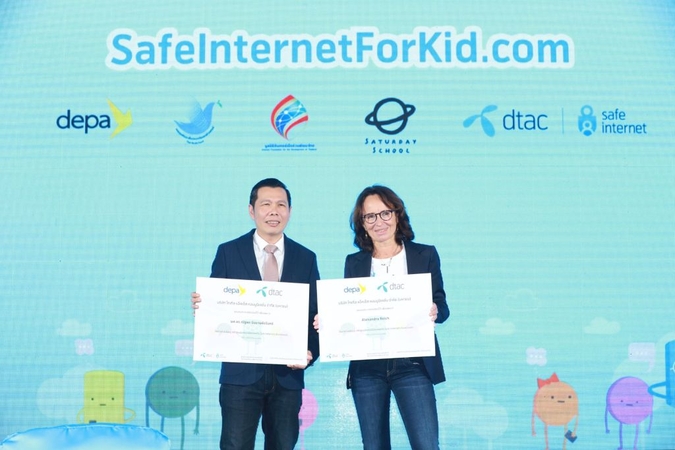
Does your child know how to keep their personal data safe, or recognise trolling?
To keep children safe online, Total Access Communication (DTAC) in partnership with Telenor Group and Digital Economy Promotion Agency (DEPA), is launching a new interactive website, SafeInternetForKid.com, to be used by schools, pupils and parents.
The site teaches youth how to avoid "catfishing", trolling and fake news, along with other online safety measures.
The internet can be a challenge to all of us. Who can you trust online? Is it okay to post that picture of your friend on social media without asking? Where is the line between humour and hurtful comments? Who can help when things go wrong? Being online provides boundless opportunities, but also some real threats.
“We see that many young people are more tech-savvy than their parents, but that does not always mean that they know how to stay safe. This is why DTAC has closely worked with Telenor Group to leverage the expertise of Parent Zone, the global experts in digital family life, to develop SafeInternetForKid.com, an online curriculum that teachers and parents can use to teach children and youths how to get the most out of the internet, while avoiding danger. DTAC is pleased to introduce this global online curriculum in the collaborative framework with DEPA to promote digital literacy as a part of the digital economy promotion policy,” Alexandra Reich, the chief executive of DTAC, said.
DEPA’s director, Ass’t Professor Dr Nattapon Nimmanpatcharin, said, “DEPA has an important mission to empower Thai citizen to be ready for the 21st Century. DEPA encourages Thai people, especially children, to increase knowledge and skills for Digital Technology while growing immunities to the risks of the internet that are usually complex, instant and impactful. DEPA has a Digital Manpower Fund, which we use as a mechanism to collaborate with other players to combat online risks and to improve Thailand’s digital economy."
SafeInternetForKid.com is aiming to build digital resilience.
While every child should be safe online, that is not always the case. A 2017 survey of Thai children and the online risk they face by Child Online Protection Action Thailand (COPAT), found a national sample of Thai children aged 9-18, children were exposed to online risks, including pornographic risk (at 68.07 per cent of participants), cyberbullying (46.11 per cent) and dating friends online (15.97 per cent).
To prepare them for the challenges posed online, SafeInternetForKid.com aims to foster young people’s digital resilience, helping them to understand when they are at risk online, know how to seek help, learn from the experiences of being online and recover when things go wrong.
SafeInternetForKid.com is designed to help children aged 7-16, their families and schools. It is an online world with an interactive game and downloadable resources.
The site content follows a day in the life of Lil’ Blue, who faces temptations, bullies and fake news online. In the interactive game, the player answers questions to navigate Lil’ Blue safely through the digital world. Part of the curriculum is designed to be used in an offline environment, to accommodate schools without internet connection.
To optimise the benefits of SafeInternetForKid.com, DTAC has been collaborating with certain academic institutes and Inskru, a startup that aims to empower young teachers in Thailand. DTAC reached out a wide network of teachers at the secondary education level and over 50,000 students nationwide via both online and on-ground activities. “Telenor Group believes that connectivity can empower societies and reduce inequalities. This partnership is an important contributor towards our global commitment of educating 4 million children across our markets on online safety by 2020,” said Manisha Dogra, the vice president of sustainability for Asia at Telenor Group.
Young Safe Internet Leader's Camp as a platform of youth enablement to tackle online risks at schools
At a Young Safe Internet Leader’s camp, more than 200 youths and teachers will discuss initiatives to tackle online risks at schools with experts. The youth initiatives will be further developed into projects-in-action at schools with the advice and financial support from DTAC and the Internet for Thailand Foundation.
As a data-driven mindset and skills are critical for the workforce in the present and the future, the youths will also be exposed to digital opportunities and future skills such as using data for visualisation and storytelling. Serving as a platform for youth enablement through a collaboration with DEPA and the Internet for Thailand Foundation, the first camp series will take place this October.
To learn how to stay safe online while having fun, check out www.safeinternetforkid.com.


